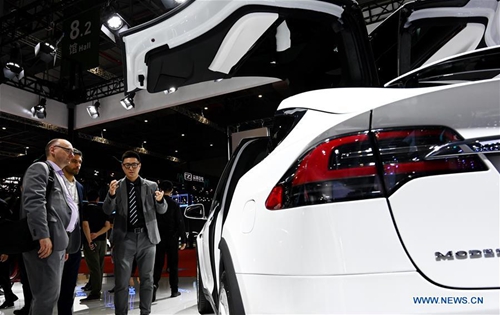HOME >> BUSINESS
Tesla faces tougher competition in China's EV market
Source:Global Times Published: 2019/6/16 21:13:40
Evergrande’s ambitions likely to challenge US carmaker

Visitors view a Tesla SUV during the 18th Shanghai International Automobile Industry Exhibition in Shanghai, east China, April 17, 2019. (Photo:Xinhua)
Evergrande Group signed a strategic cooperation agreement with the government of Shenyang, Northeast China's Liaoning Province, Saturday to build three bases worth 120 billion yuan ($17.33 billion) for new-energy vehicles (NEVs), according to a posting on the company's website. Analysts said that Tesla will face tougher competition in the Chinese NEV market.
The bases include facilities for research and development (R&D) and factories for fully assembled automobiles, in-wheel motors and power batteries.
Evergrande is not the first to pursue cooperation on NEVs involving auto manufacturers, governments and research institutions, Su Hui, an automobile expert based in Beijing, told the Global Times on Sunday.
For example, last week, Evergrande signed an agreement worth 160 billion yuan with the government of Guangzhou, South China's Guangdong Province.
Tesla is likely to face tougher competition in the Chinese NEV market, said Su. "Before Evergrande, Chinese auto manufacturers already had large market shares ... BYD, Geely Automotive Group (the parent company of Volvo) and BAIC Group, and its subsidiary, Beijing Electric Vehicle Co ... those are just some. Evergrande brings fierce competition to the market."
Tesla is building its first overseas factory in Shanghai to increase production and fulfill the company's ambition of taking a big chunk of China's NEV market. Tesla's factory in Shanghai will reduce costs and allow mass production so that Tesla can make more profits, Jia Xinguang, executive director of the China Automobile Dealers Association, told the Global Times on Sunday.
The EV market could be worth trillions of yuan in the coming decades, Evergrande Chairman Hui Ka Yan said during a conference on earnings in March.
According to the China Association of Automobile Manufacturers, 1.6 million electric vehicles will be sold this year.
China has seen rapid development of NEVs and is in the leading position in the field of EVs, Su added.
Tesla's EVs can run for longer distances, not because of better batteries but because the car bodies are lighter, Jia said. "Tesla is using carbon fiber and aluminum that can reduce vehicles' weight by hundreds of kilograms, which reduces energy consumption."
Tesla acquired battery company Maxwell in May. Calling the acquisition "quite strategic," Elon Musk, CEO of Tesla, told an annual shareholders' meeting Tuesday: "There are some very important technologies there that I think will have an effect on the cost and scaling of cell production. Both reducing the cost and reducing the capital required to scale production."
Chinese manufacturers have to develop technologies to allow mass production to better compete against Tesla, Jia added.
Evergrande, the newcomer in the NEV market, helps complete the industrial environment, Su said.
Newspaper headline: Tesla faces tougher competition in EV market
Posted in: INDUSTRIES,COMPANIES